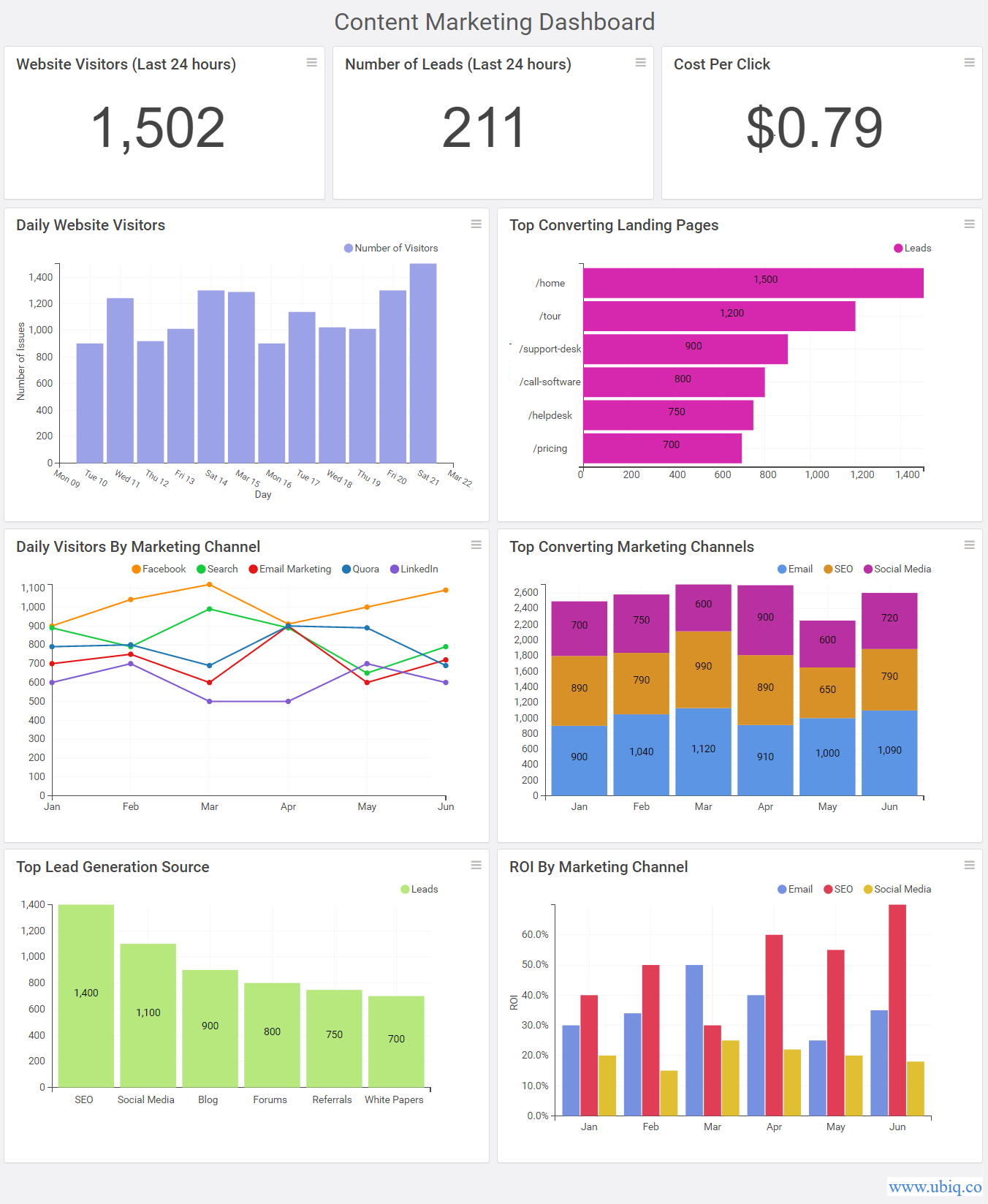Content Marketing KPIs & Metrics help you measure content marketing performance against content marketing goals. Here are the top content marketing KPIs & metrics you can track using content marketing dashboards.
Top Content Marketing KPIs & Metrics to Track Regularly
Here are the top content marketing KPIs & metrics you can monitor regularly.
1. Unique Views
Unique Views is one of the most important content marketing KPIs. It measures the total number of unique visitors who have viewed your content during a given period of time, typically a 30-day window.
Its is a good indicator of your content’s reach.
Initially, you can measure overall daily unique views for your blog/website. As your website/blog’s traffic grows, you can measure unique views by each traffic source. This will tell you which marketing channels (SEO, Social Media, Email) are effective.
You can also measure unique views by each piece of content and determine the top 5 content by traffic. This will tell what content topics drive most traffic to your website.
Bonus Read : Top Ecommerce KPIs & Metrics to Track
2. Traffic by Location
Visitor Traffic by Geography is also an important content marketing KPI metric. It tells you if you are targeting the right audience, and where to allocate your marketing budget.
For example, if your business is meant for US audience while your blog attracts majority visitors from UK, then they might not convert into paying customers, and you may have to rethink your content topics.
So measure visitors by country regularly, and optimize your content strategy.
Also Read : What Makes a Good KPI Dashboard
3. Traffic by Device
It is important to measure visitors by their device type so that you are attracting the right audience to your business.
For example, if your business is a mobile app then it is important that majority of your visitors access your content on mobile. If they are desktop users, then it will be difficult to make them download your app.
Similarly, if your business is a B2B web application for desktop users, then you must ensure that most of your visitors are desktop users.
Bonus Read : Top 5 Marketing Metrics & KPIs to Track
4. Time Spent
How long do your visitors spend time reading your content? 12 seconds, or 12 minutes?
If visitors spend a lot of time on your content, then it indicates good engagement. If your blog get thousands of visitors but if they spend less than 10 seconds on your posts, it means they are simply bouncing off your content, and are not going to convert into paying customers.
In that case, you may need to develop content around more relevant topics for your target audience.
Bonus Read : How to Create a Dashboard for Your Business
5. Page Views/Unique Visitors
Measuring Page Views per visitor tells you how many pages, an average visitor reads on your website/blog. The higher this content marketing KPI the better it is.
It shows that your content is engaging and people are returning to your website to read more. This will help you develop similar content in future.
Measure the total number of page views over a time period (e.g 30 days) and divide it by the total number of unique views to get average number of page views per visitor.
Also Read : Key Website Performance Indicators to Measure
6. Social Sharing
Social sharing is one of the best content distribution KPIs for every business. A few shares can skyrocket your content’s reach and brand awareness.
Use a social media plugin like AddThis to measure the number of social shares for your content. This will help you identify which topics & content type (blog, white paper, infographics, etc) are shared more, so you can develop more such content in future.
It will also tell you which social media channel (Twitter, Facebook, LinkedIn) gives your content more traction.
Create a content marketing dashboard using a tool like Ubiq to track these KPIs & metrics.

Hopefully, the above content marketing KPIs and metrics can help you measure content marketing performance, increase brand awareness and get more visitors.
Ubiq makes it easy to visualize data in minutes, and monitor in real-time dashboards. Try it Today!
Sreeram Sreenivasan is the Founder of Ubiq. He has helped many Fortune 500 companies in the areas of BI & software development.